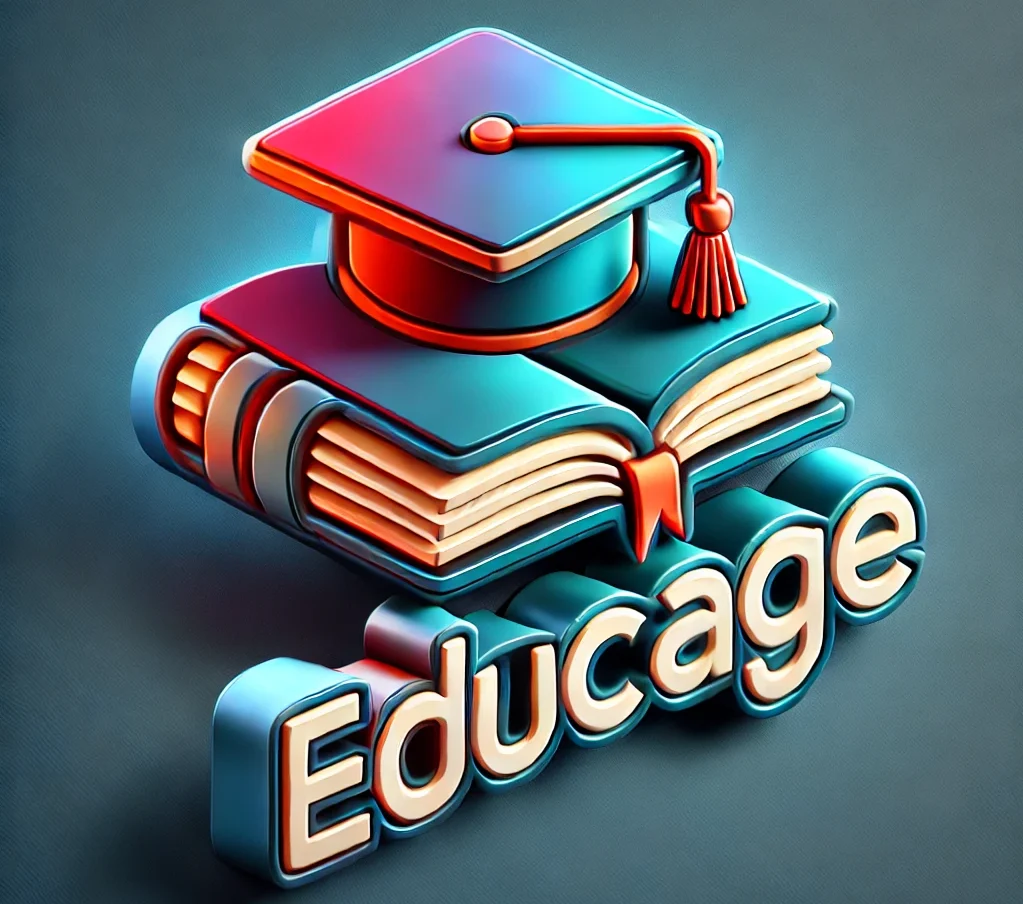Have you ever thought about how AI could change your lesson planning? Today, teachers have new AI tools that save time and make learning fun. Tools like ChatGPT and MagicSchool are big helps for teachers.
Using AI for lesson planning is key for modern teachers. AI can look at curriculum, student data, and teaching goals. This lets you make lessons that fit each student’s needs, boosting their grades and interest. For instance, AI can make quizzes, plan lessons, or spot where students might be struggling12.
AI makes teaching faster and learning better. It gives you tools to connect with students and meet their learning needs. To learn more about using AI in your classroom, check out AI for lesson planning and its big impact on teaching today.
Key Takeaways
- AI tools can save educators hours of time during the school year.
- Personalized lesson plans generated by AI can improve student engagement.
- AI assistants can enhance lesson design by providing tailored resources and suggestions.
- Utilizing technology in teaching fosters a creative and interactive learning environment.
- AI tools help teachers align lessons with curriculum standards efficiently.
- The combination of AI technology and human insight is crucial for effective education.
The Role of AI in Modern Education
Artificial intelligence changes education by making learning better. It helps teachers focus on new ideas, not just routine tasks. A study shows 97% of education leaders see big benefits from AI3.
AI tools give teachers deep insights. They help track how students are doing and make changes when needed.
In classrooms, AI makes learning fun and personal. For example, 25% of teachers say AI makes learning fit each student’s needs3. Tools like Microsoft’s Shiksha Copilot and MagicSchool.ai cut down planning time4.
These tools make teaching easier. You can make resources quickly or create flashcards with Quizlet’s “Study Guides.”
But, using AI in schools is not without its hurdles. Half of teachers say they need more training to use AI well3. Still, AI’s potential is huge, with 52% using it for brainstorming3.
What Is AI for Lesson Planning?
AI for lesson planning is a new way to make lesson plans better. It uses artificial intelligence to help teachers create plans that work well. These tools can make lesson outlines, suggest activities, and design tests that fit what students need and what the curriculum says.
AI makes lesson plans better by understanding the classroom better. This makes learning more fun and effective.
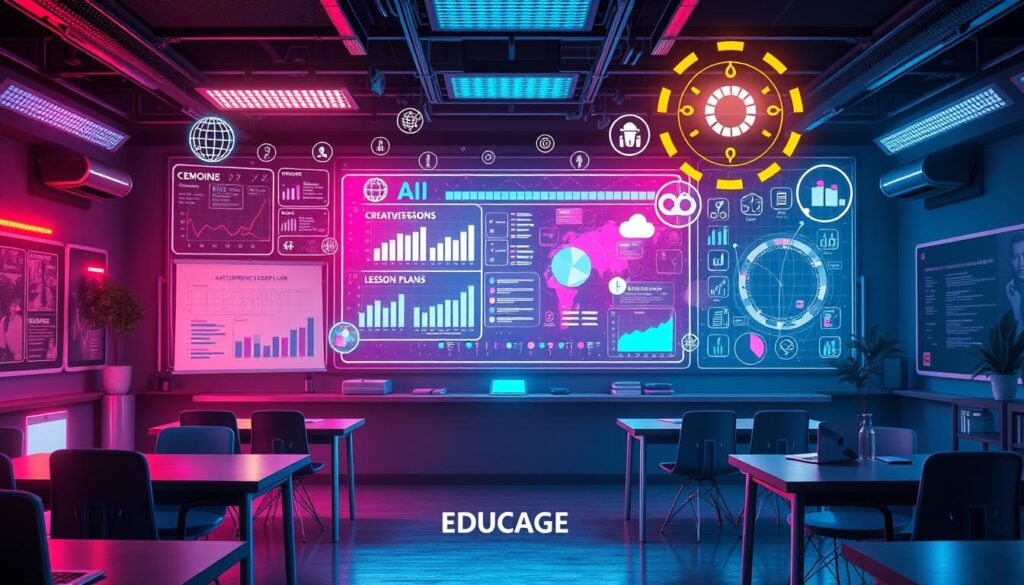
AI looks at a lot of data to give teachers ideas that fit each student. For example, it helps teachers set goals by knowing what students can do, how they learn best, and what they need to learn5. It also makes detailed plans based on what the goals are, what skills are needed, and what students like5.
Using AI, teachers can add new ideas to their plans. This makes the classroom more exciting. AI can also teach in a way that’s consistent and helps teachers spend more time with students5.
But, teachers need to watch out for mistakes AI might make. Some AI tools can give wrong information, so teachers should check what they get6. As AI gets better, using it with teacher help will make learning even better.
| AI Tool | Description | Pricing |
|---|---|---|
| ClickUp Brain | Customizable lesson plan templates | Free Forever to Enterprise at custom pricing |
| ChatGPT | Generates lesson outlines and research assistance | Free Version; ChatGPT Plus $20/month |
| LessonPlan.ai | Creates lesson plans 10X faster | Pro version $19/year |
| Learnt.ai | Personalized lesson plan crafting | Free for a lifetime; Essentials starting at $15/month |
| Teachology.ai | Includes quiz creation and assessment features | Basic (Free), Starter $6/month, Pro $12/month |
| Auto Classmate | AI Coach Chatbot for lesson planning | Free plan with 300 queries |
Benefits of Using AI in Lesson Planning
AI in lesson planning brings many benefits that change education. It saves teachers a lot of time, letting them focus more on students. AI handles tasks like organizing resources and tracking progress, making planning more efficient7.
This saves time and makes the classroom more engaging and interactive.
Time Savings in Lesson Preparation
AI makes lesson planning much faster. It handles tasks that used to take hours, giving teachers more time with students. Tools like AI lesson planning tools find research and ideas quickly, all in one place7.
This lets teachers manage class activities better and focus on what’s important.
Enhanced Creativity and Idea Generation
AI boosts creativity in lesson planning by suggesting new ideas and improving classic materials7. Platforms like Claude.ai help create engaging plans that fit different learning styles8.
This lets teachers try new methods while keeping lessons effective.
Personalized Learning Experiences
AI can make learning plans for each student, based on their strengths and interests. This makes learning more fun and relevant for each child9. AI also helps meet different learning needs by creating content for each student’s goals9.
Using AI helps create a classroom where everyone learns in their own way.
Smart Lesson Planning Tools for Teachers
In today’s education, smart lesson planning tools are key. They help teachers make lesson plans, create materials, and come up with new ideas. These tools help teachers make learning fun and effective for students.
AI Assistants like ChatGPT
AI assistants, like ChatGPT, are great helpers in AI for lesson preparation. They help teachers make lesson plans that meet educational standards. This makes lessons relevant and high-quality.
About 94% of users say these AI tools save time, making planning easier10. Also, 72% of users feel more confident teaching new topics with these tools’ help11.
AI Image Generators for Engaging Visual Content
Adding visuals to lessons is important for keeping students interested. AI image generators make eye-catching visuals that match lesson content. Tools like Canva for Education and DALL-E make this easy, saving time for planning.
Teachers like adding interactive activities to these plans, which boosts student involvement12.
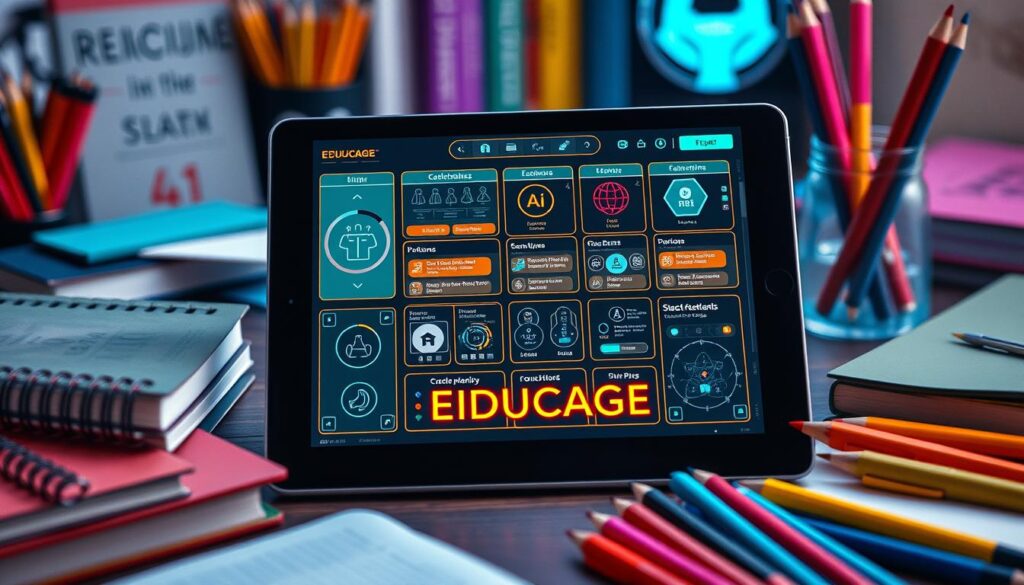
There are over 70 AI tools on platforms like MagicSchool to help with lesson planning. These tools can be adjusted for different students, making lessons more inclusive11. This flexibility helps reach all kinds of learners, making the classroom a welcoming place for everyone.
AI for Lesson Planning: Enhancing Existing Lessons
Today, teachers are using AI to make their lessons better. AI tools help them update and improve their plans. They add new content, multimedia, and interactive parts, making lessons more engaging and effective.
Teachers often spend a lot of time planning lessons. AI can help by making plans that fit the needs of all students13. It also helps set SMART goals that match educational standards, leading to better learning14.
When you see how students are doing, AI can suggest changes to your lessons. Tools like Alayna help you make and share lesson plans easily13. AI can also turn old content into exciting, multimedia-rich materials that grab students’ attention.
There are many tools out there to help. For example, Education Copilot makes lesson plans quickly, and HiLink offers detailed plans with fun activities and tests15. These tools are great for making your lessons better.
Using AI in teaching makes lessons more efficient and fun. It allows for quick changes and personalized teaching. This creates a learning space that works for every student, leading to a great educational experience.
Planning New Lessons with an AI Assistant
Learning about AI lesson planning tools can really help you make new lessons. These tools make planning easier and keep lessons fun and right for your students. They help you stick to the curriculum and find the best resources.
Key Features of AI Lesson Planning Software
- Curriculum Alignment: Makes sure lessons fit educational standards and goals for your students.
- Resource Aggregation: Finds and gathers educational materials from different places, saving you lots of time.
- Content Generation: Creates new lesson ideas and activities based on your themes or goals.
- Analytics: Gives you data on how students are doing and where they need help.
Examples of AI Lesson Planning Tools
There are many AI tools to help with lesson planning. MagicSchool and Microsoft Copilot are great examples. They help teachers save time and get creative with their lessons. Aila can even save teachers up to four hours a week, making it a big help16.
Using AI tools can also make lessons better by making them fit each student’s needs17.
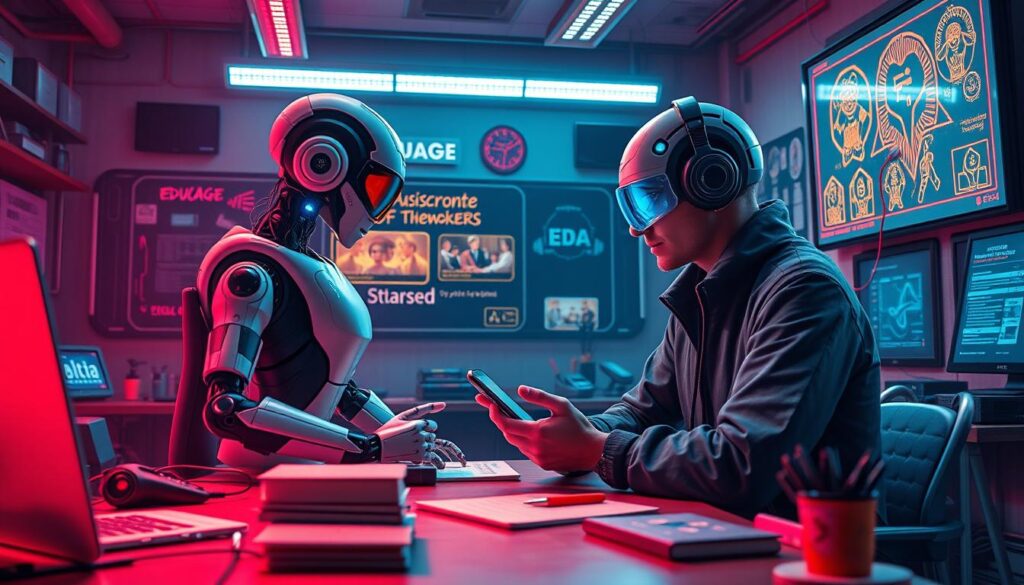
Technology is making AI teaching assistants more common in schools. This lets you spend more time with students and less on paperwork. These tools change how teachers plan lessons, making it more creative and efficient18.
They help you quickly adjust to changes in the curriculum or student needs. This makes learning more exciting and dynamic171816.
Steps to Incorporate AI in Your Lesson Design
Adding AI to your lesson plans can make teaching more efficient and keep students interested. By following specific steps for AI integration, you can use the latest technology to improve learning. This makes your classroom a better place for everyone.
Identifying Learning Objectives
Start by setting clear learning goals that match educational standards. Having specific targets helps AI tools provide the right resources. This makes your lesson plans better and helps students learn more effectively.
Utilizing AI for Resource Gathering
After setting your goals, use AI to find extra resources. This could be articles, videos, or interactive tools that fit your learning objectives. AI can also analyze student data to offer personalized materials and insights into how students learn best19.
Look into the many AI tools available to help you find these resources. They can make your lessons more engaging for better student participation.
Creating Interactive and Engaging Content
The last step is to make your content interactive and engaging. AI can help with tasks like making lesson plans, saving you time and boosting creativity20. Also, think about using AI tools for peer-to-peer learning to encourage teamwork among your students.
With well-designed content, you can see better results and keep your classroom lively.
Challenges and Considerations of AI in Education
When we talk about AI in schools, we must face its challenges. It has many benefits, but there are also risks. For example, only 9% of teachers use AI tools, while 27% of students do21. This gap can affect the quality of lessons.
AI can sometimes give wrong or biased information. This can make learning less effective. So, it’s very important to make sure AI gives accurate answers.
Ensuring Accuracy and Bias in AI Responses
Getting AI to be accurate is a big deal. For example, OpenAI’s GPT-3.5 was not very accurate, but GPT-4.0 is much better22. We need to keep a close eye on AI to avoid mistakes and keep learning true.
The Importance of Teacher Oversight
Teachers are key in using AI wisely. They check and improve AI’s work, making sure it helps learning. With many students trying AI tools, there’s a big risk of cheating21.
Teachers also need to think about privacy and fairness when using AI23. So, teachers must be active in using AI to make learning safe and effective.
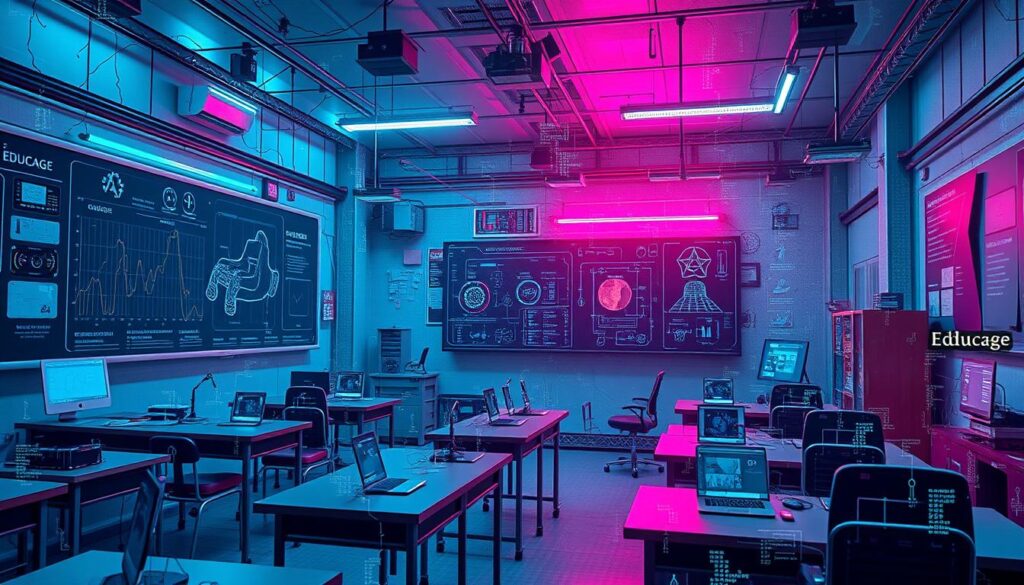
Case Studies: Successful AI Integration in Lesson Planning
Education case studies show how AI helps in lesson planning. Schools like the Georgia Institute of Technology and the University of Alicante use AI tools. These tools make teaching better and keep students interested.
The AI assistant “Jill Watson” at Georgia Institute of Technology answers student questions fast and right. This shows how AI can help teachers a lot24.
At the University of Alicante, “Help Me See” makes campus better for visually impaired students. This boosts student participation in lessons24.
New Town High School used “Maths Pathway” AI to improve math skills. Students got better grades and were more engaged24.
The University of Sydney’s “Smart Sparrow” gave students unique learning experiences. This improved their grades and interest in learning24.
Harris Federation used AI tools like ChatGPT and Microsoft Live. These tools cut down teacher work. ChatGPT makes texts for different ages, and Microsoft Live translates lessons live24.
Oak National Academy’s AI systems cut teacher work by five hours a week. This lets teachers spend more time teaching and talking to students24.
Technology has advanced a lot in the last year and a half. Now, AI tools are easier for teachers to use. These tools help teachers give feedback faster and grade work automatically25.
AI can look at lots of data to find trends in learning. This helps teachers tailor their teaching to each student. Personalized learning is key in today’s schools25.
Case studies show AI’s big role in improving education. They show how AI can make learning better for everyone.
Future Trends of AI in Education
The world of education is changing fast, thanks to AI. Machine learning is making it easier for teachers to understand what students need. This means students will get a learning experience that’s just right for them, leading to better results.
Evolution of Machine Learning in Curriculum Design
Machine learning is changing how we design school lessons. It’s making learning more personal. Studies show AI can help students remember things better by up to 30%26.
This means teachers can focus more on helping each student grow. Students will be more engaged and do better in school.
Potential of AI-Driven Teaching Strategies
AI is making teaching more fun and interactive. For example, 50% of teachers use AI to help plan lessons26. This helps them reach students in different ways.
Also, schools using AI have seen a 12% jump in graduation rates26. This shows how AI can really help students succeed.
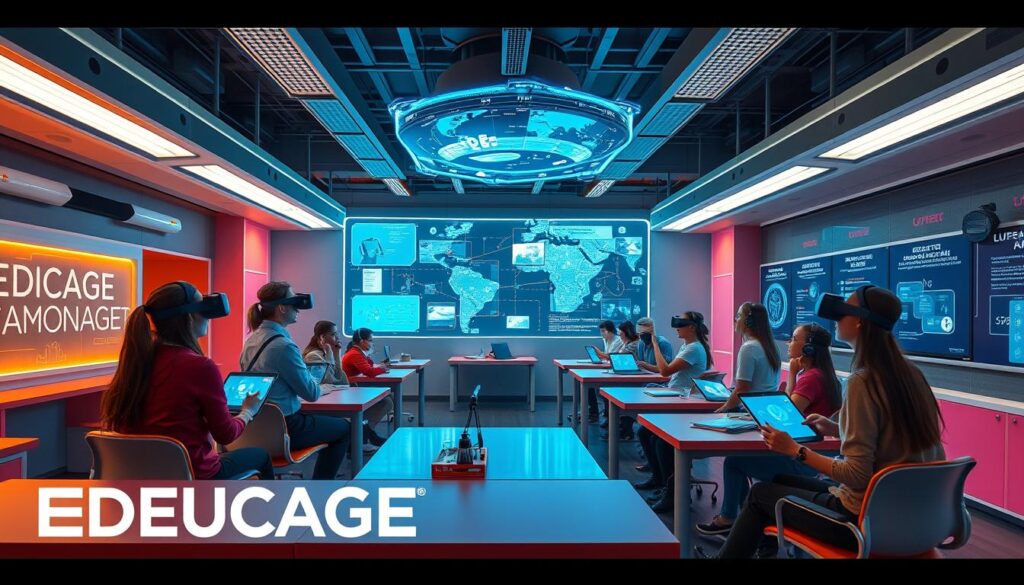
Tips for Optimizing Teaching with AI
Using AI in teaching is key for today’s educators. It helps you plan lessons better and saves time. This lets you focus more on interacting with students. Studies show 42% of teachers use AI for planning, making it a big part of education27.
Maximizing AI Features for Lesson Planning
Look for AI tools that make planning easier. Sites like Edcafe help find teaching materials quickly. Canva lets teachers create beautiful visuals for their lessons28. These tools are great for making materials that meet different student needs27.
Integrating Technology with Pedagogical Knowledge
Using AI with teaching methods makes it a helpful tool. Setting clear goals with SMART criteria improves your planning. Technology helps with assessments through quizzes and hands-on activities28. This mix creates a learning environment where technology really helps students learn.
Remember, AI is powerful, but your judgment is key in planning. Use resources like Khan Academy to find new ways to use AI in teaching28.
Resources for Teachers on AI Tools
As a teacher, you have many resources to help you use AI in your lessons. These resources for teachers on AI improve your knowledge and offer support. They also help you connect with other teachers, leading to better lessons.
Online Communities and Support
Online communities for AI in education are great for meeting other teachers. You can learn from their experiences with tools like ChatGPT and LessonPlans.ai. Sharing tips and getting feedback makes your classroom more engaging.
Being part of these communities boosts your skills and expands your professional network.
Professional Development Opportunities
Staying updated with education technology is key. Many programs teach you how to use AI tools well. They give you new strategies and resources for teaching with AI.
Look for workshops and courses on AI in teaching. Growing professionally makes you a better teacher. This leads to better learning for your students.
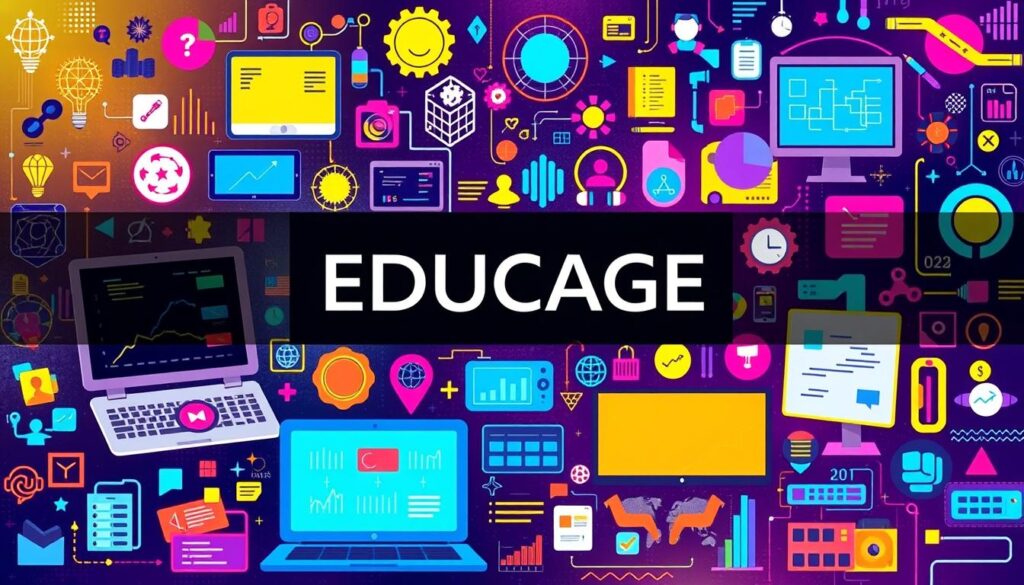
To learn more about AI in schools, check out online guides. For examples and tips on using AI in lessons, visit this resource. It’s full of ideas for your classroom29.
Conclusion
Using AI in lesson planning changes how you teach, making learning more fun and personal. It saves time and helps meet different learning needs. Many teachers say AI boosts their creativity and helps make lessons that fit all students’ levels3031.
Thinking about the future of teaching with AI shows how important it is to keep up with tech. AI helps analyze student data and creates learning materials. It also helps you design better lessons and strategies. Plus, getting training on AI in education can help you use these tools better3032.
In the end, using AI wisely can make learning better. You can make your classroom more interactive and successful. This way, technology helps, not hinders, your teaching3132.
